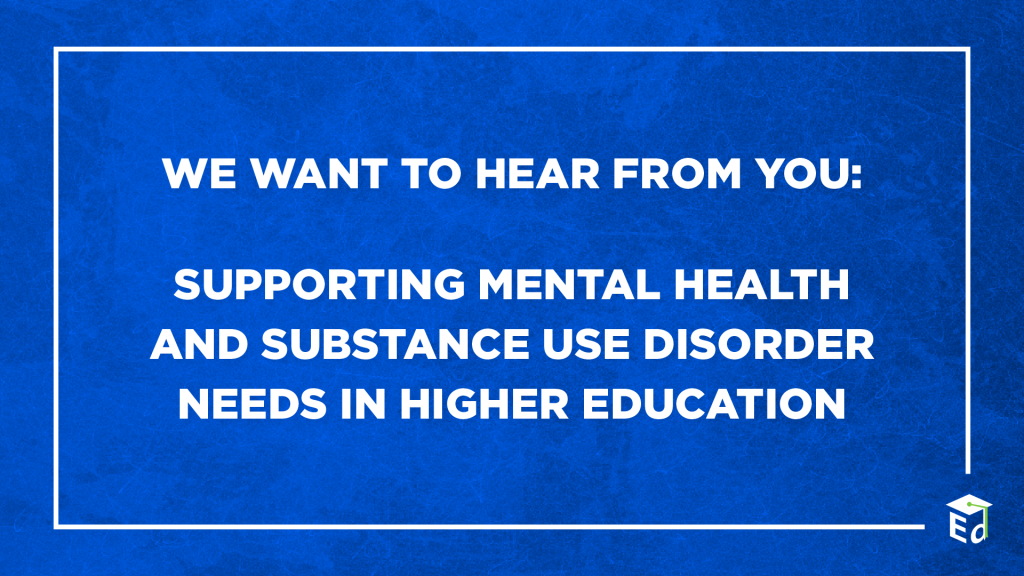[ad_1]

By: Roberto Rodriguez, Assistant Secretary of the Office of Planning, Evaluation, and Policy Development.
If you need suicide or mental health-related crisis support, or are worried about someone else, please call or text 988 or visit the National Suicide & Crisis Lifeline’s chat to connect with a trained crisis counselor.
The need for mental health support has been on the rise across the country over the past two decades. In addition to rising rates of depression and anxiety among young people, suicide is the second leading cause of death among 10-14- and 20–34-year-olds. Additionally, according to data from the 2022 National Survey on Drug Use and Health, the prevalence of substance use disorders involving either drugs or alcohol in 18- to 25- year olds is approximately 28 percent.
The Biden-Harris Administration and the Department of Education (Department) have long been focused on promoting access to behavioral health (mental health and/or substance use disorders) support at both the K-12 and postsecondary levels as an integral strategy to supporting overall student well-being and success. Since taking office, this Administration has provided resources and guidance to institutions to help them address student behavioral health needs, including:
- June 2021: Issued Volume 3 of the ED COVID-19 Handbook – Strategies for Safe Operation and Addressing the Impact of COVID-19 on Higher Education Students, Faculty, and Staff. This resource included a section focused on meeting the mental health needs of students and staff during the COVID-19 pandemic.
- October 2021: Issued a joint fact sheet with the Department of Justice on Supporting and Protecting the Rights of Students at Risk of Self-Harm in the Era of COVID-19.
- March 2022: In response to a series of bomb threats received by several Historically Black Colleges and Universities, Vice President Kamala Harris and the Department announced that these institutions are eligible to apply for grant funds under the Project School Emergency Response to Violence (Project SERV) program. The Department has subsequently awarded a total of $2.7 million to help address campus safety and mental health needs for students and faculty.
- May 2022: Released a Frequently Asked Questions document regarding Using Higher Education Emergency Relief Fund (HEERF) Institutional Portion Grant Funds to Meet the Mental Health and Substance Use Disorder Needs of Students. The Department also collaborated with the American Council on Education on a webinar to help increase our reach to grantees.
- May 2022: Hosted a panel during the Department’s Office for Civil Rights’ Recovery to Thriving: Supporting Mental Health and Students with Disabilities summit – discussing mental health in higher education and how HEERF funds could be leveraged.
- September 2022: Published a blog post and partnered with the Department of Health and Human Services (HHS) on multiple initiatives including announcing the transition to 988, the National Suicide and Crisis Lifeline and workforce development outreach.
In March 2023, the Department also requested a $150 million School- and Campus-Based Mental Health Services program in the President’s FY24 Budget to help institutions develop a campus-wide strategy to address mental health. Additionally, the Substance Abuse and Mental Health Services Administration (SAMHSA) – the HHS office leading suicide prevention work for the government – has released and maintained several helpful resources during this Administration, including a resource kit on the Prevention and Treatment of Anxiety, Depression, and Suicidal Thoughts and Behaviors Among College Students.
While these resources offer a helpful start, there is more work to be done to support preventative measures and address mental health and substance use disorders in higher education. The Department seeks to work alongside institutions of higher education, students, state higher education agencies, other Federal agencies, and experts in the field to ensure students and institutions have the necessary knowledge and resources to select and implement easily accessible and effective interventions. We also want to ensure that institutions are connected to evidence-based solutions and peer institutions; and can continue to help build the base of what works both for entire campuses and for specific settings and high-need populations.
To inform next steps, today the Department is issuing a Request for Information outlining a number of questions to elicit responses which we hope will provide the Department with helpful information to inform our work. In particular, we hope this request will prompt stakeholders to provide examples of effective strategies that address campus mental health and substance use disorder needs, best practices for transforming campus cultures and creating campus-wide strategies, input on the desired role for the Department, and information on the development of state-wide behavioral health strategies. The Department encourages comments from a wide array of stakeholders including institutions of higher education, students, researchers, policy experts, behavioral health professionals, State higher education agencies and systems, and other individuals familiar with behavioral health needs in higher education settings.
Working together, we can ensure all college students have access to mental health and substance use disorder supports and services and end this crisis once and for all.
[ad_2]



